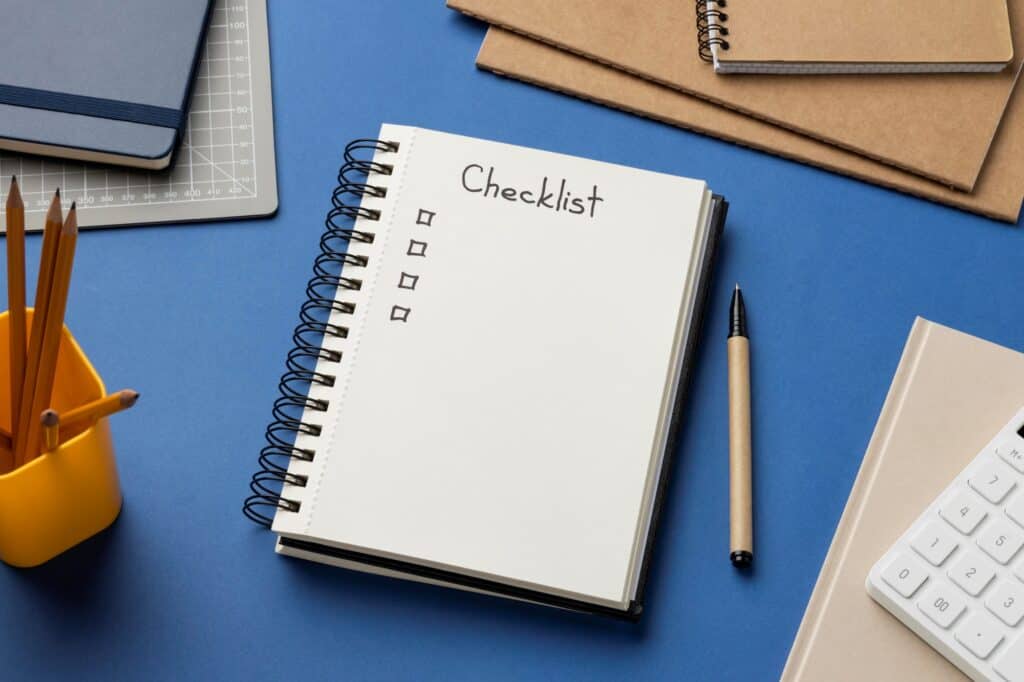Want to make your move easier? This guide will show you how to create a comprehensive moving checklist that covers every aspect of your upcoming move. From planning and packing to settling in, a well-organised checklist is essential. It should include key tasks like selecting a moving date, coordinating with a moving company, organising important documents, and updating your new address with utility companies and financial institutions. Follow these steps for a smooth, organised move.
Key Takeaways
- Assess your unique moving needs, including home size, special items, and distance, to create an effective moving checklist.
- Select a flexible moving date to save costs and ensure availability of services, while also considering local regulations in West London.
- Organise essential documents separately, create an inventory list for your belongings, and schedule administrative tasks early for a smoother transition.
Understanding Your Moving Needs
Before addressing logistics, consider your unique moving needs. The size of your home plays a significant role in how long it will take to pack and move your belongings. For instance, a three-bedroom house will naturally require more time and effort compared to a studio apartment. The distance of your move will affect logistics, timing, and costs.
Your personal circumstances might necessitate special considerations. Are there any valuable or sensitive items that need extra care? Are there any accessibility issues at your new location? Addressing these special requirements early can prevent headaches later. A well-structured moving house checklist will help you stay organised and ensure that no detail is overlooked.
Including these factors in your plan will offer a clear roadmap for your move. This sets the foundation for a smooth transition, enabling you to address potential challenges effectively.
Setting Your Moving Date to West London
Picking the right moving date requires strategic thinking. Summer is a popular time for families to move due to school schedules, but this peak season can make it harder to book a moving company. Being flexible with your moving date can lead to cost savings, as moving companies will often offer better rates during off-peak times.
Consider your work schedule and the availability of friends and family who might assist with the move. Booking your moving services early helps secure better rates and avoids last-minute hassles. Consult with your movers about available dates and any price differences between peak and off-peak times.
Don’t forget to account for logistical considerations. Parking restrictions in West London can be strict, so check local regulations and arrange any necessary permits. Planning ahead ensures that your moving day goes off without a hitch.
Creating an Inventory List
Creating an inventory list is a vital part of your moving checklist. Documenting everything that needs to be moved helps categorise your belongings and decide what to keep, donate, or discard. This step simplifies packing and provides a clear picture of your belongings, essential for insurance purposes.
A detailed inventory list helps prevent loss and ensures everything is accounted for during the move.
A detailed inventory list helps prevent loss and ensures everything is accounted for during the move. It also helps the removal company estimate moving costs more accurately. This list will make packing and unpacking more efficient and less stressful.
Administrative Tasks
Administrative tasks are crucial for a smooth transition but are often overlooked. Schedule utility services in your new home before moving to ensure everything is operational when you arrive. Keep all important documents in a dedicated folder to maintain accessibility and security during the move.
Update your new address with banks, insurers, utility providers, and local authorities. Submit a change of address form to arrange for mail redirection. This should be done at your local post office. This ensures you don’t miss any important correspondence during the transition.
Update your electoral roll and school records, if applicable. Handling these tasks early will prevent disruptions and help you settle into your new property more quickly.
Gathering Packing Supplies
Collecting the right packing supplies is essential for protecting your belongings. Collect sturdy cardboard boxes, packing tape, bubble wrap, and markers. Speciality items like mattress covers and dish barrels can be useful for specific needs.
These supplies are available at big-box stores, supermarkets, or discount retailers. Free cardboard boxes can often be sourced from community groups or local businesses for those looking to save. Just ensure that used boxes are clean and sturdy enough for moving.
Proper packing supplies prevent damage and make the moving process more efficient. Clearly label boxes to streamline unpacking and ensure fragile items are well-protected during transit.
Organising Important Documents
Organising important documents is crucial during a move. Keep documents like passports, birth certificates, and insurance policies with you rather than packing them with other items. Transporting these personally ensures they remain safe and accessible.
Use a dedicated folder or box for these documents to keep them organised and easy to find. This will help you avoid the stress of searching for critical paperwork when needed.
Decluttering and Downsizing

Decluttering before a move reduces the volume of items to pack. Begin this process about six weeks before moving by evaluating what to take and what to leave behind. Items unused in the past year are likely candidates for disposal.
Donate or sell unwanted items through garage sales or online platforms. This lightens your load and offers a chance to make extra cash.
Decluttering unnecessary papers and digitising important documents saves physical space while preserving memories. A well-planned decluttering process makes packing manageable and ensures only the essentials make it to your new home.
Packing Strategies
Good packing strategies can make a significant difference. Start by packing items used less frequently. Pack room by room to avoid feeling overwhelmed. Label boxes with their destination room to streamline unpacking.
Assign unique identifiers to each item for tracking during the move. Update your inventory list regularly to ensure nothing is left behind.
High-quality packing materials are crucial for protecting fragile items like glassware and electronics. These strategies make start packing more efficient and ensure your belongings arrive safely.
Preparing Your Old House
Complete several tasks before handing over the keys to your old house. Thoroughly check the premises to ensure no personal belongings are left behind. Defrost and clean the refrigerator and freezer, ensuring they are completely dry.
Gather all house keys, including duplicates, and organise them for the new owners. Leave instruction manuals for appliances and systems to help the new occupants.
Ensure all windows are securely closed and utilities are turned off before you leave. These steps ensure your old house is in good condition, providing a smooth transition for the new house owners.
Coordinating with Your Removals Company to West London
Communicating effectively with your removals company is key to a successful move. Inform them of any special handling needs for sensitive items like antiques or electronics. Discuss potential obstacles at both locations, such as narrow hallways or staircases.
Provide a detailed briefing sheet, including a floor plan of your new home, to assist the removal company in planning the move. Ensure they conduct a home survey to assess the load and logistics.
Verify contact details, their insurance coverage and check if they offer services like un-plumbing appliances and furniture assembly. These preparations ensure the removals company is well-prepared and that your move goes smoothly.
Final Preparations on Moving Day

Final preparations on a moving day are crucial for a smooth transition. Wake up early to prepare for the movers and begin moving items to the new home. Prepare an essentials box with items you’ll need immediately upon arrival.
Double-check all rooms, closets, and cabinets to ensure nothing is forgotten. Confirm utility shutdowns and ensure all family members are ready. These last-minute checks help avoid surprises and ensure a smooth moving day.
Settling into Your New Home in West London
Upon arrival at your new home, unpack essentials for the bedroom and bathroom first to ensure comfort. Change all locks on exterior doors for security. Connect essential utilities like electricity and water to make your new home functional.
Inspect the new home for damages or maintenance issues and locate the circuit breaker and main water valve for emergencies. Transfer your children’s school records and find new healthcare providers. These tasks help you settle into your new home quickly and comfortably.
What to Do After Moving In
After moving in, a few more tasks remain. Childproof your new home if you have young children. Connect major appliances like the fridge to start living normally. Greet your new neighbours to establish a sense of community. Plan a housewarming party to celebrate your new home and meet your neighbours.
Summary
In summary, moving to West London can be a smooth and organised process with the right planning and preparation. From understanding your moving needs to settling into your new home, each step is crucial for a successful move. Remember, a comprehensive moving house checklist is your best friend during this journey. With careful planning and attention to detail, you can make your move to West London a positive and exciting experience.
Frequently Asked Questions
Why is it important to create an inventory list?
Creating an inventory list is essential because it categorises your belongings, allowing you to estimate moving costs accurately and minimising the risk of loss. This organised approach ensures a smoother moving experience.
How can I save on packing supplies?
You can save on packing supplies by obtaining free cardboard boxes from community groups or local businesses and seeking discounts at big-box stores. This approach not only reduces costs but also promotes sustainability by reusing materials.
What should I do with important documents during the move?
It is essential to keep important documents like passports, birth certificates, and insurance policies accessible and transport them personally during your move. This ensures their safety and easy access when needed.
How can I make unpacking easier?
Labelling boxes with their destination and maintaining an inventory list will streamline unpacking and ensure you keep track of your belongings. This organised approach makes settling into your new space much more manageable.
What should I do after moving into my new home?
After moving into your new home, prioritize unpacking essentials, changing the locks, connecting utilities, and introducing yourself to your new neighbours. This sets a solid foundation for your new living experience.







